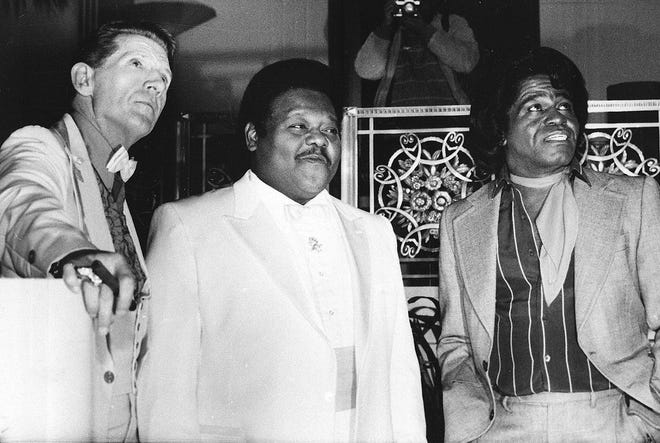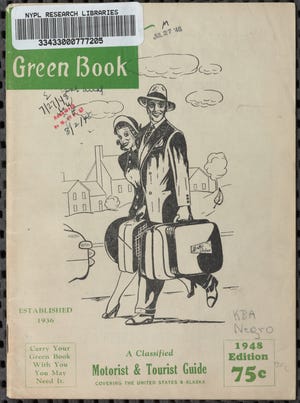Move over, Memphis and Cleveland.
Louisiana’s rock ‘n’ roll roots run deep from New Orleans to Shreveport to Ferriday, and Rep. Tanner Magee wants the state to lay claim to what he contends is rock ‘n’ roll’s true birthplace.
Magee’s House Bill 889 would create America’s Rock and Roll Museum in New Orleans aligned with the legendary Dew Drop Inn hotel and nightclub on LaSalle Street.
Black musicians stayed and performed at the Dew Drop from the 1940s until it closed in the 1970s.
“You could argue the Dew Drop is where the birth of rock ’n’ roll took place,” said Preston Lauterbach, author of “The Chitlin’ Circuit and the Road to Rock ’n’ Roll” (W. W. Norton). “The New Orleans culture mixed with the touring artists who were coming through. That’s what really made it a special place.”

‘Rooted in racism’:Ban on jazz music removed by New Orleans schools one century later
Ready for Festival food?:ind out which vendors will be at Festival International 2022
The Dew Drop Inn is being renovated by New Orleans developer Curtis Doucette Jr., who this month closed on the project’s financing and has begun initial demolition and remediation. Doucette estimates that the cost to restore The Dew Drop Inn as a boutique hotel and music venue will be $10 million. He hopes to finish the project by Mardi Gras of next year, although he admitted that was an optimistic goal.
A second measure from Magee, House Bill 895, would create the LaSalle Cultural Corridor for neighborhood development, which would be anchored by the museum and Dew Drop Inn.
“This has been a dream of mine for years,” Magee said in an interview with USA Today Network. “We shouldn’t let other cities claim our rightful legacy and profit from it without telling our own story.”
Magee, a rock ‘n’ roll history buff with a dizzying array of albums at his home in Houma, notes New Orleans favorite son Fats Domino recorded “The Fat Man” in 1949, two years before Ike Turner’s “Rocket 88” was cut at Memphis’ Sun Records studio.
Sun Records and other sources cite “Rocket 88” as the first rock ‘n’ roll record.
“This is categorically untrue,” he said. “It’s undeniable that Fats Domino released ‘The Fat Man’ in 1949.”
And there’s Hank Williams’ and Elvis Presley’s ground-breaking performances at The Louisiana Hayride in Shreveport and the birthplace of cousins Jerry Lee Lewis, Mickey Gilley and Jimmy Swaggart in Ferriday, where the Delta Music Museum is located.
“All these things that we have in this state and we’re not telling that story,” said Magee, a Republican who is the second-highest-ranking member in the House as speaker pro tem.
“We’re allowing Memphis to take credit for this stuff because after you leave Sun Records, they tell you over and over and over again that they are the birthplace of rock ‘n’ roll,” he told members of the House Municipal Affairs Committee during the bill’s hearing Wednesday.
More:A vital piece of Black music history set for rebirth
Read this:Louisiana still officially honors Confederate holidays. This bill would change that.

Cleveland lays its own birthplace claim — and is home to the Rock & Roll Hall of Fame — largely through disc jockey Alan Freed popularizing the music he was playing for his mostly white audience in the early 1950s.
But none of those important rock ‘n’ roll riffs in Memphis or Cleveland can match Louisiana’s credentials, Magee said, with the foundation formulated at the Dew Drop Inn.
New Orleans soul singer Irma Thomas, who often performed at the Dew Drop Inn, recalled its unique vibe in a 2021 interview with USA Today Network.
“It was the place to be in terms of entertainment,” Thomas said. “It was the place to be if you were a person who liked the nightlife.”
It was a rare venue where Black and white artists and customers shared a stage and audience, encouraged by founder Frank Painia, who was arrested at least twice for not maintaining a segregated club.
“It was normal,” Thomas said. “Of course, we knew it was wrong according to law (in the Jim Crow South). We didn’t see anything wrong with it.”
Magee has tucked a $1 million appropriation into next year’s state budget bill as seed money for the LaSalle Cultural Corridor and its development.
In other news:Lafayette’s Festivals Acadiens et Créoles through the years
More:Led Zeppelin tribute band, Swan Song, hopes to make impression on Lafayette’s music scene

He said no site has been identified for the museum, but Magee’s legislation would also require the state to fund its operations through the lieutenant governor’s budget once it’s built.
Magee said that even though the new museum would be located in New Orleans, he envisions statewide tie-ins to places like Shreveport and Ferriday.
“It’s our collective story as a state,” he said.
Greg Hilburn covers state politics for the USA TODAY Network of Louisiana. Follow him on Twitter @GregHilburn1.

